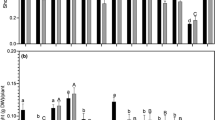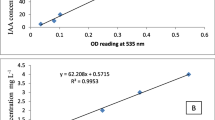Abstract
The effect of six Bradyrhizobium sp. (lupin) strains (WPBS 3201D, WPBS 3211D, USDA 3040, USDA 3041, USDA 3042 and CB 2272) and Fe supply on nodulation, N2-fixation and growth of three lupin species (Lupinus termis, L. albus and L. triticale) grown under Fe deficiency in an alkaline soil, were examined in sterilized and non-sterilized pot experiments. When inoculated with USDA 3040, 3041, 3042 and CB2272 without Fe addition, the three lupin species had a very low nodule number and mass, low shoot and root dry matter accumulation and lower N yield. However, inoculation with WPBS 3201D and 3211D without Fe treatments increased all these parameters substantially. The ability of WPBS 3201D and 3211D to form nodules on the three lupin species under conditions of Fe stress could be attributed to their ability to scavenge Fe from Fe-deficient environments through their siderophore production. Addition of Fe to the other four strains significantly increased nodulation and N2-fixation of the three lupin species, indicating that the poorer nodulation and N2-fixation of these strains in the absence of Fe, resulted from a low ability to obtain Fe from alkaline soils. Bradyrhizobium strains WPBS 3201D and 3211D were superior to the other four strains in terms of promoting greater nodulation, N2-fixation, plant growth and N accumulation of L. termis and L. albus. However, the other four strains were more efficient in symbiotic association with L. triticale. The greater variations in nodule efficiencies (specific nitrogenase activity) under different levels of Fe supply could be attributed to the quantities of bacteroid protein and leghaemoglobin in the nodules. The results suggested that Bradyrhizobium (lupin) strains differ greatly in their ability to obtain Fe from alkaline soils, and that the selection of bradyrhizobial strains which are tolerant of Fe deficient soils could complement plant breeding for the selection of legume crops for Fe-deficient soils.
Similar content being viewed by others
Author information
Authors and Affiliations
Additional information
Received: 5 January 1998
Rights and permissions
About this article
Cite this article
Abd-Alla, M. Nodulation and nitrogen fixation of Lupinus species with Bradyrhizobium (lupin) strains in iron-deficient soil. Biol Fertil Soils 28, 407–415 (1999). https://doi.org/10.1007/s003740050513
Issue Date:
DOI: https://doi.org/10.1007/s003740050513




